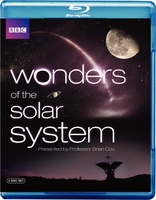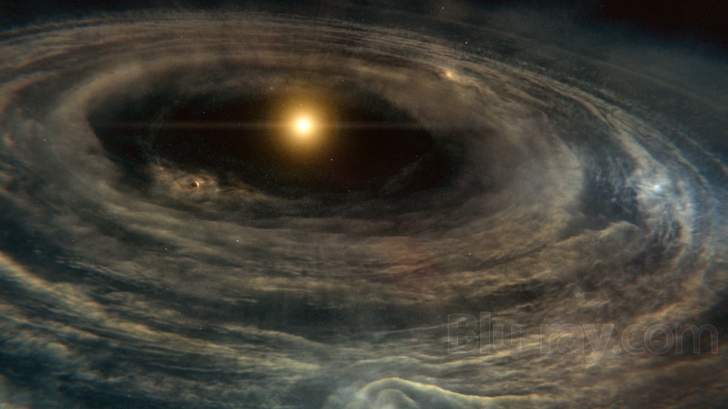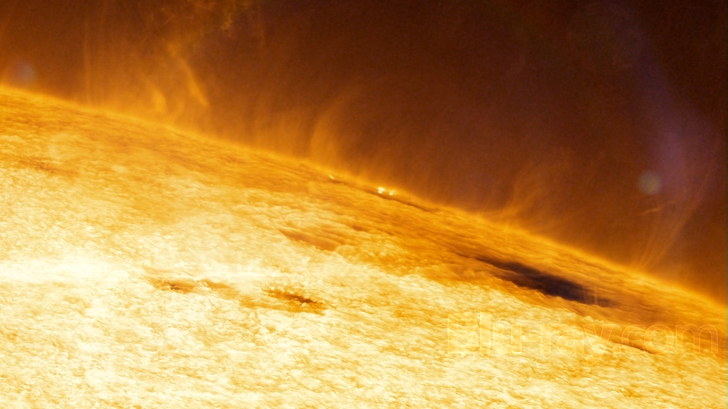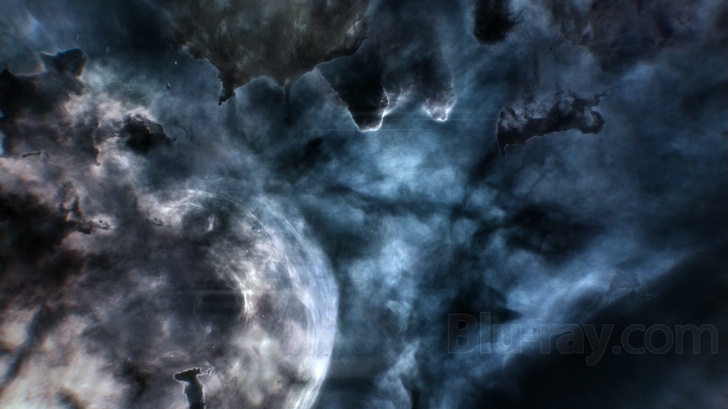Wonders of the Solar System Blu-ray Movie
HomeWonders of the Solar System Blu-ray Movie 
BBC | 2010 | 300 min | Not rated | Sep 07, 2010
Movie rating
8.2 | / 10 |
Blu-ray rating
| Users | 4.2 | |
| Reviewer | 3.0 | |
| Overall | 3.7 |
Overview
Wonders of the Solar System (2010)
All five episodes from the BBC documentary science series presented by Professor Brian Cox. Whether it's Saturn's rings, the solar flares of the Sun or the deserts of Mars, Professor Cox demonstrates how the forces that shaped our world are also responsible for creating some of the most breathtaking sights in our solar system.
Starring: Brian Cox (XX)| Documentary | Uncertain |
| Nature | Uncertain |
Specifications
Video
Video codec: VC-1
Video resolution: 1080i
Aspect ratio: 1.78:1
Original aspect ratio: 1.78:1
Audio
English: DTS-HD HR 5.1
Subtitles
English
Discs
50GB Blu-ray Disc
Two-disc set (2 BDs)
Playback
Region free
Review
Rating summary
| Movie | 3.5 | |
| Video | 3.5 | |
| Audio | 3.5 | |
| Extras | 2.0 | |
| Overall | 3.0 |
Wonders of the Solar System Blu-ray Movie Review
While the good professor's delivery is an acquired taste, the series itself is more digestible...
Reviewed by Kenneth Brown August 26, 2010When was the last time you gazed up at the stars? Not a casual glance from your car window or a cheesy attempt to impress a first date... I'm talking about a genuine study of the heavens. Chances are, you -- like every other internet-surfing, TiVo-addicted, gamerscore-driven entertainment enthusiast -- haven't laid out on a blanket and stared into space for a long, long time. Me? Before a disappointing outdoor music festival left me with little to do but turn my attention upward, I hadn't realized how long it had been since I took the time to simply bask in the wonders of the solar system. Soon enough, my impromptu summer star-gazing turned into one of my most relaxing decompressions of my adult life. I had lost sight of the vast unknown; forgotten how mesmerizing it could be. I had become so accustomed to burying my nose in LED screens and computer monitors that the most thrilling high definition experience in existence was escaping me. It's this same fascination that's driven particle physicist and University of Manchester professor Brian Cox to keep his eyes on the stars for forty years. The same fascination that makes Wonders of the Solar System, hyper-enthusiastic as its host may be, such an intriguing BBC series.

"Ride the celestial waves and crash on the shores of the universe..."
We live on a world of wonders. A place of astonishing beauty and complexity. We have vast oceans and incredible weather. Giant mountains and breathtaking landscapes. If you think that this is all there is, that our planet exists in magnificent isolation, then you're wrong...
Over the course of the series' five episodes, Cox travels to exotic locales around the world in an attempt to unravel the greatest mysteries of our solar system. We first find him in India, where a total solar eclipse helps illuminate his first subject, the sun. In the aptly named "Empire of the Sun," the exuberant professor examines the star's light, energy, heat, solar winds and unimaginable power, and discovers just how far its reach stretches. With high spirits and meticulous reasoning, he delves into the sun's humble origins, its place in the cosmos, its affect on the planets in our solar system and its eventual demise. It's a fitting opener; one that sets the stage for everything that follows. In "Order Out of Chaos," Cox turns his attention to a planet that has long intrigued everyone from grade-schoolers to veteran scientists: Saturn. Chasing tornadoes in Oklahoma and visiting an icy lake in Ireland, he uses a number of small, home-brewed wonders to paint a layman's picture of Saturn. He investigates the formation of its rings, its many distinct moons, and the volatile geysers of Enceladus, all to dizzying effect. His delivery is fast and fierce, and yet he repeats and elaborates just enough to make it easy to keep up.
Next up is "The Thin Blue Line," a look at Earth's atmosphere and its role in protecting the planet from the devastating forces of the universe. He treks into the deserts of Africa to tell the sad tale of Mercury, a barren wasteland stripped of its atmosphere long ago; heads to Alaska to introduce Titan, a moon blessed with a thick atmosphere, and home to the only other pools of liquid discovered in our solar system; and takes to the skies to see Earth's heavenly shield, up close and personal. From there, "Dead or Alive" follows the professor to Mauna Kea as he analyzes the geography and topography of the planets, and Ethiopia as he focuses on the volcanoes that shaped their surfaces. As it turns out, one of Jupiter's moons -- Io -- is still teeming with volcanic activity, a launchpad of captivating theories that elevate the series' fourth episode above the rest. As his brief but thought-provoking journey comes to an end, Cox ponders whether life exists on other planets and moons in our solar system. In "Aliens," he descends to the bottom of the Pacific, tours the US Scablands, and explores a toxic cave in Mexico to study life that exists in the harshest conditions. He questions whether Europa, another one of Jupiter's moons, is home to similar organisms, and waxes poetic about the solar system's greatest wonder: Earth.
Wonders of the Solar System is an altogether enjoyable and informative BBC series; one that sinks its teeth into Earth's backyard and digs into a variety of diverse topics. Cox comes on quite strong at times -- his chummy charm and pointed passion will annoy as many people as it excites -- but he's an earnest host, and manages to condense a seemingly endless stream of information into a digestible, five-episode banquet. My gripe isn't with Cox though, it's with the relatively short length of the series. Earth, Jupiter and Saturn muscle their way into the spotlight again and again, leaving everything from Venus to Neptune out in the cold. While more episodes would have helped -- after all, Cox could ramble on till the sun turns black and still not run out of things to talk about -- a wider scope would have been more appreciated (regardless of whether it was stretched over five episodes or twelve). Overeager personalities and slim scope aside, Wonders of the Solar System is a solid series with plenty to offer those who've gazed at the stars and pondered the mysteries of our sun and neighboring planets.
Wonders of the Solar System Blu-ray Movie, Video Quality 

Wonders of the Solar System isn't a high-dollar documentary series, nor is it a striking, high definition showcase piece. But that doesn't mean space junkies should brush it aside. BBC Video's 1080i/AVC-encoded transfer is a solid one, and looks about as good as I expected. Cox's cameras and CG cutaways aren't exactly top shelf, but they are serviceable. Colors are fairly strong (albeit a tad washed out), skintones reflect the mood of the sun, black levels are decent (if not occasionally unreliable), and quality tends to take a hit whenever Cox visits dimly lit labs or gazes at the night sky. Detail is a bit inconsistent as well. Fine textures are of the 1080i television-presentation variety (in other words, somewhat soupy), edges are crisp and clean (despite some obvious ringing) and the clarity of the series' CG sequences tends to highlight the shortcomings of the live-action footage that follows. If all that sounds like an indictment of BBC's transfer, take comfort in the fact that the majority of these issues trace back to the source, not a lazy encode. So what ruffled my feathers then? Artifacting and banding, faint and fleeting as both may be, are frequent nuisances, intermittent noise is a slight distraction, aliasing pops up from time to time, and other oddities abound. Individually, the presentation's digital anomalies aren't cause for concern. Together though, they hold Wonders of the Solar System back from Planet Earth-like greatness.
Wonders of the Solar System Blu-ray Movie, Audio Quality 

Wonders of the Solar System features an above average DTS-HD High Resolution 5.1 surround track (not to be confused with a full-fledged DTS-HD Master Audio lossless mix) that handles what little comes its way. Cox's narration is hearty, intelligible and perfectly centered, and his on-site explanations and interview segments are just as commendable, overcoming a number of natural hurdles (wind, air hiss, background chatter and other environmental noise). Otherwise, there isn't much to get excited about. The LFE channel pipes up long enough to give solar flares, steam vents and colliding asteroids welcome oomph, and the rear speakers grab hold of a few distinct elements and exploit them for their immersive properties. Still, the whole of the mix is inevitably front-heavy and doesn't deliver an enveloping experience. Dynamics are bold, but directionality is limited; sound effects are convincing, but pans are in short supply. Again, nothing about the series' AV presentation should dissuade you from considering this release. Just don't expect to be blown away by the discs' transfer or DTS-HD HR track.
Wonders of the Solar System Blu-ray Movie, Special Features and Extras 

The 2-disc Blu-ray edition of Wonders of the Solar System includes two bonus documentaries as well. The first, "What On Earth Is Wrong With Gravity" (SD, 49 minutes), takes a look at the fascinating force that keeps us all grounded, and the second, "Do You Know What Time It Is?" (SD, 59 minutes), delves into the intricacies of time itself. Both are welcome additions to the release, and are comparable to the series' main episodes.
Wonders of the Solar System Blu-ray Movie, Overall Score and Recommendation 

The solar system is a fascinating place. That much is certain. Whether or not you want to spend five hours listening to professor Brian Cox explain why it's a fascinating place is another matter altogether. Cox's hyper-enthusiastic delivery will appeal to some and alienate others, and your enjoyment of Wonders of the Solar System will depend on whether you find him to be a gracious host or a grating tour guide. Still, regardless of whether you love or loathe him, the series would have benefited from more episodes and a broader scope. BBC Video's Blu-ray release isn't perfect either, but its AV presentation should please anyone who isn't packing lofty expectations. My advice? Rent Wonders of the Solar System, sample the Coxian waters and see if his down to Earth overview of the heavens speaks to your sensibilities.
Similar titles
Similar titles you might also like

Wonders of the Universe
BBC
2011

Nature's Most Amazing Events
2009

Yellowstone: Battle for Life
2009

Earth - The Power of the Planet [BBC DVD]
2007

The Universe: The Complete Season Seven
Ancient Mysteries Solved
2013

Frozen Planet
The Original UK Series
2011

Life
BBC / Narrated by David Attenborough
2009

Wild China
2008

Galápagos
2006

Human Planet: The Complete Series
BBC
2011

HOME
2009

Wild Pacific
2008

Planet Earth
The Complete Series
2006

Earth: The Biography
2007

Madagascar
BBC
2011

Life Story
2014-2015

Steep
2007

Kingdom of Plants 3D
Kew 3D
2012

Ganges
2007

Over America
1995